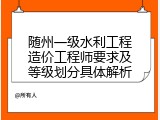随州水利工程解析
随州作为湖北省的重要地级市,其水利工程建设在区域经济发展和民生保障中扮演着关键角色。随州的水利工程不仅涉及防洪、灌溉、供水等传统功能,还逐步扩展到生态修复和水资源优化配置等现代领域。这些工程的复杂性要求具备高度专业化的技术人才支撑,尤其是一级水利工程造价工程师,他们在项目投资控制、成本管理和经济效益评估中发挥着不可替代的作用。对随州一级水利工程造价工程师的要求及等级划分进行解析,不仅有助于理解地方水利行业的人才结构,还能为从业者提供职业发展的清晰路径。本文将从随州水利工程的总体背景入手,深入探讨其核心项目特点,并详细解析一级造价工程师的职责、技能要求、等级划分标准以及随州地区的具体实践,以期为行业和相关人士提供全面的参考。
随州水利工程的背景与重要性
随州地处长江流域和汉江流域的交汇地带,水资源丰富但分布不均,历史上曾多次遭受洪涝和干旱灾害的威胁。这使得水利工程建设成为随州基础设施的重中之重。从早期的水库和堤防工程,到现代的智能水利系统和生态水利项目,随州的水利发展经历了从单一防洪到多功能综合管理的转型。
例如,随州的大型水库如先觉庙水库和封江口水库,不仅保障了农业灌溉和城乡供水,还通过水力发电促进了区域能源结构的优化。
除了这些以外呢,随州在中小河流治理、水土保持项目以及南水北调配套工程等方面也取得了显著进展。这些工程不仅提升了水资源利用效率,还增强了地区的防灾减灾能力,为随州的经济发展和社会稳定奠定了坚实基础。水利工程的复杂性要求高度的专业化和精细化管理,其中造价控制作为工程管理的核心环节,直接关系到项目的投资效益和可持续性。
随州水利工程的核心项目解析
随州的水利工程涵盖多种类型,每种类型都有其独特的特点和造价管理需求。
下面呢是几个核心项目的简要解析:
- 水库与蓄水工程:如先觉庙水库扩建项目,这类工程涉及土石方工程、混凝土结构和大坝安全监测,造价管理需重点关注材料成本、劳动力分配和风险评估。随州的水库项目往往投资巨大,周期较长,因此造价工程师需进行全生命周期成本分析,确保资金使用的合理性。
- 防洪与堤防工程:随州的多条河流如府河和漂水河需要定期治理,堤防加固和河道疏浚项目频繁。这类工程的造价管理强调应急性和适应性,工程师需快速响应政策变化和自然条件波动,优化资源配置以避免超支。
- 灌溉与供水系统:随州是农业大市,灌溉网络如随中灌区项目覆盖广泛,涉及管道铺设、泵站建设和智能化控制系统。造价管理在这里需平衡初始投资与长期运营成本,例如通过价值工程分析选择性价比高的技术方案。
- 生态水利项目:近年来,随州推动了水生态修复工程,如湿地建设和水资源循环利用项目。这些项目融合了环境工程元素,造价管理需纳入生态效益评估,工程师需掌握绿色造价方法和可持续发展指标。
总体而言,随州水利工程的多样性和规模性要求造价管理不仅关注传统成本控制,还需融入技术创新和风险管控。这为一级水利工程造价工程师提供了广阔的实践平台,同时也提出了更高的专业要求。
一级水利工程造价工程师的角色与职责
在随州的水利工程中,一级水利工程造价工程师是项目管理的核心成员,其职责远超出简单的成本计算。他们需在项目全周期中发挥多重作用:
- 投资估算与预算编制:在项目初期,工程师需基于随州的地质条件、市场行情和政策法规,编制详细的投资估算和设计概算。这要求他们熟悉本地水利工程的特点,例如随州多山地形带来的施工难度增加,可能导致成本偏差。
- 成本控制与变更管理: during construction, engineers monitor expenses, handle change orders, and mitigate risks such as material price fluctuations or weather delays. In Suzhou's context, where projects often face seasonal floods, this role is critical to avoid budget overruns.
- 合同管理与招标采购:工程师负责起草和评审合同条款,确保符合随州的行业标准。他们还需组织招标活动,评估投标方案,选择最优承包商,以保障工程质量和成本效益。
- 竣工结算与审计:项目完成后,工程师进行最终结算和审计工作,提供成本分析报告,为后续项目提供数据支持。在随州,这一环节 often involves government oversight, requiring engineers to navigate regulatory requirements.
此外,一级造价工程师还需具备跨部门协调能力,与设计师、承包商和政府机构合作,确保项目 align with Suzhou's development goals. Their expertise directly impacts the economic viability and success of水利工程, making them indispensable in the region's infrastructure landscape.
一级水利工程造价工程师的技能与知识要求
要胜任随州水利工程的造价管理,一级工程师需具备复合型的技能和知识结构。这些要求不仅基于国家标准,还需适应随州的地方特色:
- 专业技术知识:工程师必须精通水利工程设计、施工技术和材料科学,例如熟悉随州常见的岩石地基处理或混凝土防渗技术。
于此同时呢,他们需掌握造价软件(如BIM和CAD)的应用,以提高计算精度和效率。 - 经济与法律素养: understanding of economics, finance, and contract law is essential. In Suzhou, where water projects often involve public funding, engineers must know local policies on bidding and environmental compliance to avoid legal pitfalls.
- 数据分析与风险评估: ability to perform cost-benefit analysis and risk assessment is crucial. Given Suzhou's susceptibility to natural disasters, engineers need to model scenarios like flood impacts on project timelines and budgets.
- 软技能: communication, teamwork, and problem-solving skills are vital for collaborating with diverse stakeholders. For instance, negotiating with local communities affected by projects requires cultural sensitivity and diplomacy.
这些技能确保工程师能应对随州水利工程的复杂性,从技术细节到宏观管理,全方位保障项目的经济效益和社会价值。
等级划分的具体解析:从初级到高级的路径
水利工程造价工程师的等级划分 typically follows a national framework but may incorporate local adaptations in Suzhou. The hierarchy is designed to reflect experience, expertise, and responsibilities, with the一级工程师 representing the senior tier. Below is a breakdown of the levels:
- 初级工程师(助理级): entry-level position requiring a bachelor's degree in engineering or related fields. They assist in basic cost calculations and documentation under supervision. In Suzhou, beginners might start on smaller projects like irrigation channels to gain practical experience.
- 中级工程师: after gaining 3-5 years of experience and passing professional exams, engineers move to this level. They independently handle预算编制 and site cost management. In Suzhou, mid-level engineers often work on regional防洪 projects, developing skills in risk handling.
- 高级工程师(副高级): with 5-10 years of experience, they lead teams and manage complex projects. They focus on strategic cost optimization and policy compliance. In Suzhou, this level might involve overseeing reservoir projects or advising on ecological initiatives.
- 一级工程师(正高级): the pinnacle of the profession, requiring over 10 years of experience, advanced certifications, and a proven track record. They set cost standards, mentor junior staff, and influence regional policy. In Suzhou,一级工程师 are often involved in major infrastructure decisions, such as the integration of smart water systems.
This等级划分 ensures a clear career progression, motivating professionals to enhance their skills and contribute to Suzhou's水利工程 advancement. The system also emphasizes continuous learning, with requirements for ongoing education and certification renewals to keep pace with technological changes.
随州地区的具体实践与挑战
在随州,一级水利工程造价工程师的实践面临独特的地区性因素。随州的水文地质条件复杂,山区和丘陵地带增加了施工难度和成本不确定性。工程师需进行实地勘察和数据收集,以调整造价模型,例如在堤防工程中 accounting for soil erosion risks。随州的经济发展水平影响了资金 availability: public projects often rely on government grants or loans, requiring engineers to align costs with budgetary constraints and seek innovative financing models like PPP (Public-Private Partnerships).
此外,随州的政策环境强调生态保护,工程师必须在造价管理中纳入 environmental costs, such as compensation for生态破坏 or investments in green technologies. This adds layers of complexity to traditional cost calculations. Challenges also include talent retention: as a smaller city compared to Wuhan, Suzhou may face a shortage of highly skilled engineers, necessitating local training programs and incentives to attract expertise.
Despite these challenges, Suzhou's practices show strengths in integrating technology. For example, the use of drones and GIS for site surveys has improved cost accuracy, and digital platforms enhance collaboration among project teams. These adaptations demonstrate how一级工程师 in Suzhou not only meet national standards but also drive localized innovations to overcome regional hurdles.
未来发展趋势与职业展望
随州水利工程和造价工程师 profession are evolving in response to broader trends. Climate change is increasing the frequency of extreme weather events, necessitating more resilient infrastructure designs. In Suzhou, this means future projects will emphasize adaptive防洪 systems and water conservation, requiring engineers to master new cost metrics for sustainability. Additionally, digitalization is transforming the field: BIM and AI are becoming standard tools for predictive cost modeling and real-time budget monitoring.
For一级水利工程造价工程师, this implies a shift towards roles that blend technical expertise with strategic planning. In Suzhou, demand is expected to grow for engineers who can handle integrated water resource management and smart city initiatives. Career prospects are bright, with opportunities in government agencies, private firms, and consulting bodies. To stay relevant, professionals must pursue lifelong learning, such as certifications in green building or digital project management.
In summary, the future will see一级工程师 in Suzhou acting as key advisors on sustainable development, contributing not only to cost efficiency but also to the region's long-term resilience and prosperity. Their role will expand beyond traditional boundaries, embracing innovation and environmental stewardship.
通过以上分析,可以看出随州水利工程的复杂性和重要性,以及一级水利工程造价工程师在这一领域的核心作用。从项目解析到等级划分,再到地区实践和未来趋势,这一 profession 要求高度的专业化和适应性。随州的案例不仅反映了中国水利行业的普遍规律,也凸显了地方特色带来的独特挑战和机遇。
随着技术的进步和政策的变化,造价工程师将继续 evolve, ensuring that Suzhou's水利工程 remain efficient, sustainable, and aligned with regional needs. This comprehensive understanding underscores the value of investing in professional development and systemic support for this critical field.
